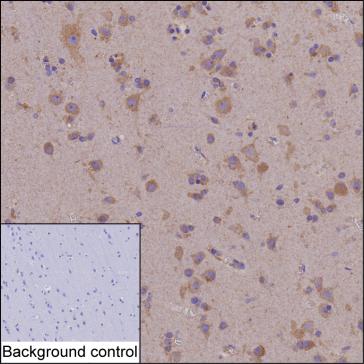
| WB | 咨询技术 | Human,Mouse,Rat |
| IF | 咨询技术 | Human,Mouse,Rat |
| IHC | 1/50-1/250 | Human,Mouse,Rat |
| ICC | 技术咨询 | Human,Mouse,Rat |
| FCM | 咨询技术 | Human,Mouse,Rat |
| Elisa | 咨询技术 | Human,Mouse,Rat |
| Host/Isotype | Mouse IgG2b |
| Antibody Type | Primary antibody |
| Storage | Store at 4°C short term. Aliquot and store at -20°C long term. Avoid freeze/thaw cycles. |
| Species Reactivity | Human |
| Immunogen | Purified recombinant fragment of human PELI3 |
| Formulation | Purified antibody in PBS with 0.05% sodium azide |
+ +
以下是关于PELI3抗体的3篇参考文献,包含文献名称、作者及摘要内容概括:
---
1. **文献名称**:*Pellino3 ubiquitinates RIP2 and mediates NOD2-induced signaling and cytokine responses*
**作者**:Yang S, et al.
**摘要**:该研究揭示了PELI3作为E3泛素连接酶,通过泛素化RIP2调控NOD2信号通路。研究使用特异性PELI3抗体进行免疫共沉淀实验,证明其在先天免疫反应中的关键作用,并促进促炎细胞因子分泌。
---
2. **文献名称**:*Pellino3 regulates the pathogenesis of experimental autoimmune encephalomyelitis via suppressing interleukin-17 production*
**作者**:Liu J, et al.
**摘要**:文章探讨PELI3在多发性硬化症模型中的作用,发现其通过抑制IL-17表达减轻神经炎症。研究通过Western blot(使用PELI3抗体)显示其在Th17细胞中的表达动态,并证实其负向调控IL-17信号通路。
---
3. **文献名称**:*The E3 ligase Pellino3 promotes adipogenesis via regulating Wnt/β-catenin signaling*
**作者**:Zhang Y, et al.
**摘要**:该研究利用PELI3特异性抗体进行组织染色,发现PELI3通过泛素化降解β-catenin抑制因子,激活Wnt通路并促进脂肪细胞分化,为代谢疾病治疗提供了潜在靶点。
---
**备注**:若需具体文献来源或更详细信息,建议通过PubMed或Google Scholar以标题/作者检索原文。部分研究可能需结合上下文确认抗体应用细节。
PELI3 (Pellino E3 Ubiquitin Protein Ligase Family Member 3) is a member of the Pellino family of E3 ubiquitin ligases, which includes PELI1. PELI2. and PELI3. These proteins are evolutionarily conserved and play critical roles in regulating immune signaling pathways, particularly those involving Toll-like receptors (TLRs) and interleukin-1 receptors (IL-1Rs). PELI3 is involved in the ubiquitination process, a post-translational modification that influences protein stability, localization, and interactions. Unlike PELI1 and PELI2. which are well-studied in the context of innate immunity and inflammation, PELI3 has been less characterized but is implicated in modulating NF-κB and MAPK signaling pathways.
Antibodies targeting PELI3 are essential tools for studying its expression, function, and interaction networks in both physiological and pathological contexts. They enable researchers to investigate PELI3's role in immune regulation, apoptosis, and cellular stress responses. PELI3 dysregulation has been associated with diseases such as cancer, autoimmune disorders, and neurodegenerative conditions, making these antibodies valuable for translational research. Commercially available PELI3 antibodies are typically developed in rabbit or mouse hosts and validated for applications like Western blotting, immunohistochemistry, and immunoprecipitation. Specificity and cross-reactivity with other Pellino family members remain key considerations during experimental design. Ongoing studies aim to clarify PELI3's distinct mechanisms and therapeutic potential in disease models.
×